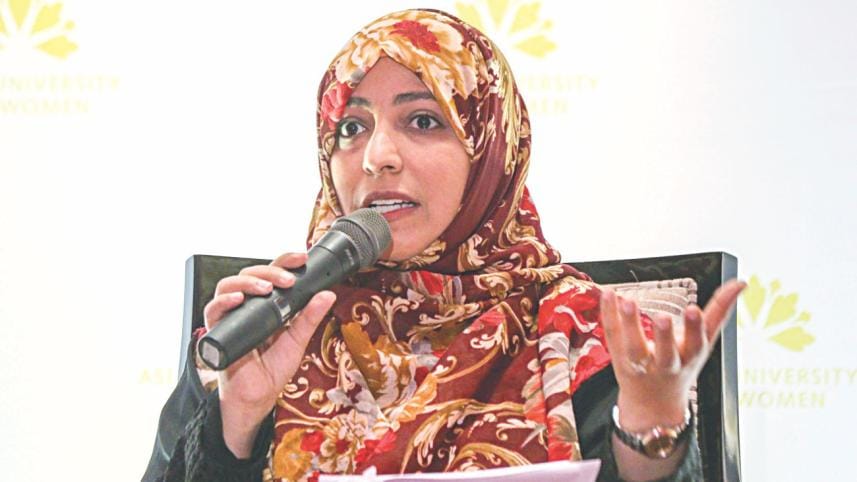It's genocide

Tawakkol Karman, a Nobel Peace Prize winner from Yemen, yesterday said what Myanmar did to the Rohingyas was “genocide”.
“We have visited the Rohingya camps recently and talked with over a hundred women and girls who are victims of sexual violence,” she said at a symposium organised by Asian University for Women (AUW) in Chittagong.
“They described us the barbarity committed before their eyes... they witnessed their kids or parents being slaughtered and shot dead in front of their eyes...their houses were burnt in front of them.
“Thousands of Rohingya people have been compelled to leave their houses,” she said, terming these incidents “genocide”.
Tawakkol was addressing the symposium titled “A Bridge Towards Sustainable Development: Overcoming Threats to Survival” held in a hotel in the port city.
The first Yemeni Nobel laureate said the world is now facing a moral deterioration as genocide and violence are going on in its different parts in the absence of international community.
“More than 500,000 people have been killed in Syria because they said they wanted freedom,” she said.
Human beings deserve democracy and freedom, she said, adding, democracy is a must for development and development is essential for peace.
Tawakkol then urged the students of AUW to fight against corruption and for justice. “Corruption leads to poverty,” she said.
“Your victory begins through your leadership,” she said, adding, “Be a leader in every field you are contributing... if you want to change, lead the change.”
Pramila Patten, special representative of the UN Secretary-General on Sexual-Violence in Conflict and UN Under Secretary General, said sectarian violence has been left unpunished for a long time.
She said what Myanmar did to the Rohingyas was “war crime”.
“Many witnesses told me many girls and women were literally raped to death,” she said, adding, “Not a single soldier or commander has been made accountable for their offence.”
“I would like to congratulate both the government and the people of Bangladesh for saving the lives of the Rohingya people,” she said, urging the world
to stand beside Bangladesh.
“It is not the problem of Bangladesh, it is the problem of international community and I think the ball is now in the court of the international community.”
Ismail Serageldin, former vice president of World Bank and founding director of the Bibliotheca Alexandrina, said the world should keep open the door for the refugees.
Izzeldin Abuelaish, a professor of the University of Toronto, termed the persecution of the Rohingyas “crime against humanity”.
“The Rohingyas have been living in Myanmar for decades. So, the Myanmar government should recognise them,” he said at the programme.
Kamal Ahmad, founder of AUW, and Prof Nirmala Rao, vice-chancellor of the university, also spoke among others.



 For all latest news, follow The Daily Star's Google News channel.
For all latest news, follow The Daily Star's Google News channel.
Comments